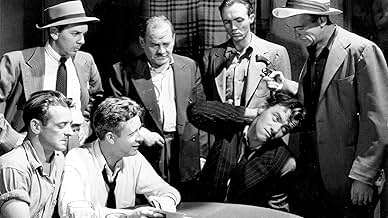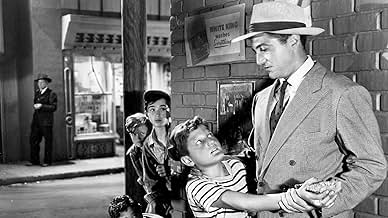Füge eine Handlung in deiner Sprache hinzuNewlyweds come to visit groom's friend, only to discover him missing; and their investigation uncovers evidence of a ring of anti-semites terrorizing the neighborhood.Newlyweds come to visit groom's friend, only to discover him missing; and their investigation uncovers evidence of a ring of anti-semites terrorizing the neighborhood.Newlyweds come to visit groom's friend, only to discover him missing; and their investigation uncovers evidence of a ring of anti-semites terrorizing the neighborhood.
Fotos
Tommy Noonan
- Bob - Barfly
- (as Tom Noonan)
William H. O'Brien
- Funeral Administrator
- (Nicht genannt)
Handlung
WUSSTEST DU SCHON:
- WissenswertesThe soundtrack by Herschel Burke Gilbert was reworked in 1952 into a library of music cues for several TV shows including Superman - Retter in der Not (1952), Captain Midnight (1954), Sky King (1951), Space Patrol (1950), Ramar of the Jungle (1952), and Racket Squad (1950). These appear on the Original Television Soundtrack CD for The Adventures of Superman, issued in 2000 by Varèse Sarabande.
- VerbindungenFeatured in John Reinhardt: Direction Without Borders (2022)
Ausgewählte Rezension
... in its exploration of anti-Semitism in a small town.
John Ireland and Jane Randolph play a pair of newlyweds who arrive in an unnamed town and are invited to stay at the apartment of an old service buddy of Ireland's. Only the buddy isn't there (they're told he'll be back by the landlady who lets them into his apartment). But as time passes the friend is a no show and there's a growing feeling that something sinister may have occurred, especially when the couple discover some white supremacist pamphlets hidden in a drawer.
In the early stages, the film hints at the prejudice in the town, with talk about "foreigners" and "staying with their own kind". Later, though, it becomes more blatant, with "a certain word" making no doubt about the object of the hatred. That bigotry insidiously trickles down to the neighborhood kids, too, slashing the tires of a car of a Jewish merchant (George Tyne in a quite effective performance), as well as preparing to throw rocks through his window.
The film has the visual elements of noir with its shadowy photography, appropriate for such a dark subject. The overall effect of the messaging in this film is, unfortunately, rather muted. The performances are adequate but restrained. However Roman Bohnen is appropriately loutish as a drunken bigot who strikes his wife (Ellen Lowe) across the face in a tavern.
And here this little "B" briefly, and tellingly, raises another ugly subject rarely broached in '40s dramas, spousal abuse. That is never more poignantly apparent than in the dialogue Lowe later delivers to Ireland in one powerful scene:
"Tell you what? How for the last five years he hasn't drawn a sober breath? How he beats me to prove that he's better than I am? He's a man. How he throws out the few flowers I pick, says they stink up the house. How he can't keep a job? Always blames it on (others)... never on to himself. How he's broken me. Torn me to pieces. Is that what you want me to tell you?"
Dialogue like that still has a strong impact, in combination with the tired anguish of Ellen Lowe's face and delivery.
John Ireland and Jane Randolph play a pair of newlyweds who arrive in an unnamed town and are invited to stay at the apartment of an old service buddy of Ireland's. Only the buddy isn't there (they're told he'll be back by the landlady who lets them into his apartment). But as time passes the friend is a no show and there's a growing feeling that something sinister may have occurred, especially when the couple discover some white supremacist pamphlets hidden in a drawer.
In the early stages, the film hints at the prejudice in the town, with talk about "foreigners" and "staying with their own kind". Later, though, it becomes more blatant, with "a certain word" making no doubt about the object of the hatred. That bigotry insidiously trickles down to the neighborhood kids, too, slashing the tires of a car of a Jewish merchant (George Tyne in a quite effective performance), as well as preparing to throw rocks through his window.
The film has the visual elements of noir with its shadowy photography, appropriate for such a dark subject. The overall effect of the messaging in this film is, unfortunately, rather muted. The performances are adequate but restrained. However Roman Bohnen is appropriately loutish as a drunken bigot who strikes his wife (Ellen Lowe) across the face in a tavern.
And here this little "B" briefly, and tellingly, raises another ugly subject rarely broached in '40s dramas, spousal abuse. That is never more poignantly apparent than in the dialogue Lowe later delivers to Ireland in one powerful scene:
"Tell you what? How for the last five years he hasn't drawn a sober breath? How he beats me to prove that he's better than I am? He's a man. How he throws out the few flowers I pick, says they stink up the house. How he can't keep a job? Always blames it on (others)... never on to himself. How he's broken me. Torn me to pieces. Is that what you want me to tell you?"
Dialogue like that still has a strong impact, in combination with the tired anguish of Ellen Lowe's face and delivery.
Top-Auswahl
Melde dich zum Bewerten an und greife auf die Watchlist für personalisierte Empfehlungen zu.
Details
- Erscheinungsdatum
- Herkunftsland
- Sprache
- Auch bekannt als
- Secret deschis
- Drehorte
- Produktionsfirma
- Weitere beteiligte Unternehmen bei IMDbPro anzeigen
- Laufzeit1 Stunde 8 Minuten
- Farbe
- Seitenverhältnis
- 1.37 : 1
Zu dieser Seite beitragen
Bearbeitung vorschlagen oder fehlenden Inhalt hinzufügen
















